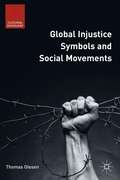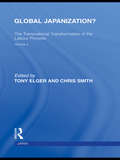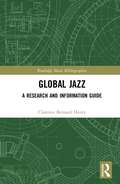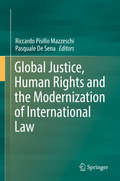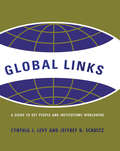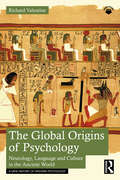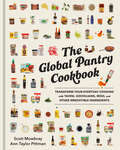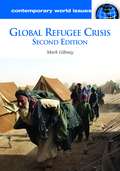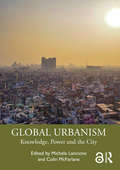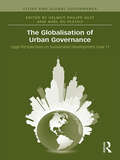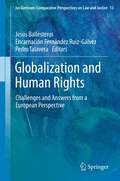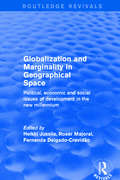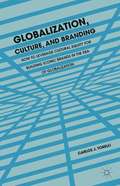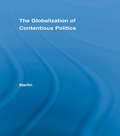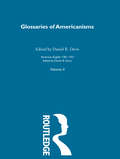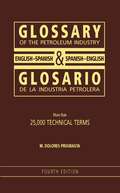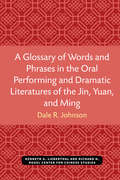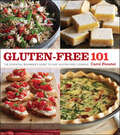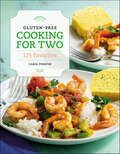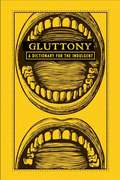- Table View
- List View
Global Injustice Symbols and Social Movements
by Thomas OlesenGlobal Injustice Symbols and Social Movements theorizes how transnational social movements create symbols of injustice in order to foster and sustain the solidarity necessary for their success. Olesen examines our collective moral and political maps, dotted with symbols shaped by political dynamics beyond their local or national origin, and offers the first systematic sociological treatment of this important phenomenon. Using empirical data collected from media archives, official documents,and internet sources, Olesen seeks to answer how global injustice symbols are formed, how they are employed by political actors, and to what ends.
Global Japanization?: The Transnational Transformation of the Labour Process (Routledge Library Editions: Japan)
by Tony ElgerGlobal Japaniziation? Brings together research from North America, Japan, Europe and Latin America to analyse the influence of Japanese manufacturing investment and Japanese working practices across the global economy. The editors present original case studies of work reorganization and workers’ experiences within both Japanese companies and those of their competitors in diverse sectors and national settings. These studies provide a wide-ranging critique of conventional accounts of Japanese models of management and production, and their implications for employees. They offer new evidence and fresh perspectives on the role of "transplants" in disseminating manufacturing innovations, and on the responses of non-Japanese firm in reorganizing production operations and industrial relations.
Global Jazz: A Research and Information Guide (Routledge Music Bibliographies)
by Clarence Bernard HenryGlobal Jazz: A Research and Information Guide is an annotated bibliography that explores the global impact of jazz, detailing the evolution of the African American musical tradition as it has been absorbed, transformed, and expanded across the world’s historical, political, and social landscapes. With more than 1,300 annotated entries, this vast compilation covers a broad range of subjects, people, and geographic regions as they relate to interdisciplinary research in jazz studies. The result is a vivid demonstration of how cultures from every corner of the globe have situated jazz—often regarded as America’s classical music—within and beyond their own musical traditions, creating new artistic forms in the process. Global Jazz: A Research and Information Guide presents jazz as a common musical language in a global landscape of diverse artistic expression.
Global Justice, Human Rights and the Modernization of International Law
by Riccardo Pisillo Mazzeschi Pasquale De SenaThis book is based on the observation that international law is undergoing a process of change and modernization, driven by many factors, among which the affirmation and consolidation of the role of the individual and of the theory of human rights stand out. In the contemporary world, international law has demonstrated an ability to evolve rapidly. But it is still unclear whether its modernization process is also producing structural changes, which affect the subjects, the sources and even the very purpose of this law. Is it truly possible to speak of a paradigmatic and ideological change in the international legal system, one that also involves a transition from a state-centred international order to a human-centred one, and from inter-state justice to global justice?The book addresses three fundamental aspects of the modernization process of international law: the possible widening of the concept of international community and of the classic assumptions of statehood; the possible diversification of the sources of general international law; and the ability of international law to adapt to new challenges and to achieve the main goals for humanity set by the United Nations.The overall objective of the book is to provide the tools for a deeper understanding of the transition phase of contemporary international law, by examining the major problems that characterize this phase. The book will also stimulate critical reflection on the future prospects of international law.
Global Links: A Guide to People and Institutions Worldwide
by Cynthia J. Levy Jeffrey D. SchultzOffers a quick and easy approach to finding up-to-date contact information for political, government, media, judicial, and legislative leaders for each country of the world. The directory provides more than 10,000 names and addresses of the most important people in the world, as well as websites of countries (when available). A vital link in the global information chain for librarians, business people, journalists, students, teachers, and any general reader interested in obtaining global contact information.
The Global Origins of Psychology: Neurology, Language and Culture in the Ancient World (A New History of Western Psychology)
by Richard ValentineThis book offers a historical introduction to the remote origins of psychology, and is the first book in a series on the history of the subject. Combining a deep history approach with the study of ancient civilisations, it places psychology in a historical and global context using rigorous academic research. This book begins by separating the Greek components of psychology – psyche and logos – in order to trace their histories, separate and together, through the global Neolithic and Bronze Ages. The author develops a toolkit by deconstructing the writing of history, modern psychology, and analysis of culture, and by introducing theories from neuroscience and cultural psychology that can be tested against the data. He then takes readers on a journey back in time, from the borders of our current climatic envelope (the Holocene) towards the present, through Ancient Iraq, Egypt, Israel, and China. Each chapter deepens the reader’s understanding of psychology in its global context outside the boundaries of Western culture. In so doing, the book initiates a post-colonial re-narration showing that the story of psychology is wider and deeper than many contemporary origin stories suggest. Presented in an accessible manner, this is an excellent resource for students of psychology, philosophy, history, linguistics, archaeology, and anthropology, as well as general readers who want to learn more about the origins of this fascinating subject.
The Global Pantry Cookbook: Transform Your Everyday Cooking with Tahini, Gochujang, Miso, and Other Irresistible Ingredients
by Scott Mowbray Ann Taylor PittmanTwo James Beard-Award winners show how to unlock the secrets of the global pantry and elevate all your favorite foodsMake the most succulent pot roast ever with oyster sauce. Transform a broiled salmon filet with miso. Give an irresistible kick to chicken wings with gochujang. Turn out the crunchiest French toast with panko breadcrumbs. Use Mexican chorizo to add depth to a quick skillet chili. Enliven a no-churn ice cream pie with freeze-dried berries. Impart a savory kick to shrimp and grits with sambal oelek. Add coconut milk to banana pudding—it&’s magical. And even your best ribs will take on a sticky new deliciousness with sweet soy sauce. In more than 120 recipes, here&’s how—with just a dash here or a tablespoon there—you can elevate your cooking using 65 common pantry items from around the world.
Global Refugee Crisis: A Reference Handbook (Second Edition) (Contemporary World Issues Series)
by Mark GibneyThere are two disparate components to the global refugee crisis: first, there are about 46 million refugees and Internally Displaced Persons (IDPs), most of whom are struggling to survive in the poorest and most violent countries in the world, and second, our interpretation of international human rights law allows this state of affairs to worsen. <p><p> Refugee protection has been a longstanding policy that ostensibly protects victims of human rights violations from other countries. In actuality, protection is largely negated by systematic efforts by industrialized states to reduce the number of refugees arriving at the borders. This book provides a comprehensive examination of this worldwide problem and rejects the idea that the majority of asylum seekers abuse the system to gain entrance into the country.
Global Urbanism: Knowledge, Power and the City
by Michele Lancione Colin McFarlaneGlobal Urbanism is an experimental examination of how urban scholars and activists make sense of, and act upon, the foundational relationship between the ‘global’ and the ‘urban’. What does it mean to say that we live in a global-urban moment, and what are its implications? Refusing all-encompassing answers, the book grounds this question, exploring the plurality of understandings, definitions, and ways of researching global urbanism through the lenses of varied contributors from different parts of the world. The contributors explore what global urbanism means to them, in their context, from the ground and the struggles upon which they are working and living. The book argues for an incremental, fragile and in-the-making emancipatory urban thinking. The contributions provide the resources to help make sense of what global urbanism is in its varieties, what’s at stake in it, how to research it, and what needs to change for more progressive urban futures. It provides a heterodox set of approaches and theorisations to probe and provoke rather than aiming to draw a line under a complex, changing and profoundly contested set of global-urban processes. Global Urbanism is primarily intended for scholars and graduate students in geography, sociology, planning, anthropology and the field of urban studies, for whom it will provide an invaluable and up-to-date guide to current thinking across the range of disciplines and practices which converge in the study of urbanism.
The Globalisation of Urban Governance: Legal Perspectives On Sustainable Development Goal 11 (Cities and Global Governance)
by Helmut Philipp Aust Anél Du PlessisThe adoption of the Sustainable Development Goals (SDGs) by the UN General Assembly in 2015 represents the latest attempt by the international community to live up to the challenges of a planet that is out of control. Sustainable Development Goal 11 envisages inclusive, safe, resilient and sustainable cities around the world by the year 2030. This globally agreed vision is part of a trend in international policy toward good urban governance, and now awaits implementation. Fourteen original contributions collectively examine how this global vision has been developed on a conceptual level, how it plays out in various areas of (global) urban governance and how it is implemented in varying local contexts. The overarching hypothesis presented herein is that SDG 11 proves that local governance is recognised as an autonomous yet interrelated part of the global pursuit of sustainable development. The volume analyses three core questions: How have the normative ideals set forth in SDG 11 been developed? What are the meanings of the four sub-goals of SDG 11 and how do these relate to each other? What does SDG 11 imply for urban law and governance in the domestic context and how are local processes of urban governance internationalised? The Globalisation of Urban Governance makes an important scholarly contribution by linking the narrative on globalisation of good urban governance in various social sciences with legal discourse. It considers global governance and connects the existing debate about cities and their place in global governance with some of the most pertinent questions that lawyers face today.
Globalization and Human Rights
by Jesús Ballesteros Encarnación Fernández Ruiz-Gálvez Pedro TalaveraGlobalisation turns out to be untenable because it does not guarantee minimum social equity, peace and respect for the environment, and therefore does not guarantee the effective accomplishment of human rights. This book analyzes this issue and raises proposals for a new perspective. The first part describes the soft threats to human rights, derived from the devaluation of the politics and the productive economy with regard to the finance. It entails the concealment of the reality in the shape of exploitation as the tax havens and in the shape of marginalization of the persons with different abilities. The second part include a study of hard threats to human rights and examines two cases of failed states: Afghanistan and Somalia, in which the violence has supplanted the politics and the economy. In view of these situations it is necessary to rethink the force of classic ius gentium and the humanitarian right. The third part presents the European Union as a legal and political space in which conditions of a worthy life are better defended by means of the Primacy of Practical Reason and Social State of Law, and by the requirement of peace as the main rule of international relations.
Globalization and Marginality in Geographical Space: Political, Economic and Social Issues of Development at the Dawn of New Millennium
by Heikki Jussila, Roser Majoral, Fernando Delgado-CravidãoThis title was first published in 2001. An examination of globalization and marginality in geographical space, it discusses the issue of marginalization and the effects that economic globalization have on marginal and critical regions from the point of view of politics and policies and the shift from economic to social issues of development.
Globalization, Culture, and Branding
by Carlos J. TorelliDrawing from novel theoretical insights in social psychology, cultural psychology, and marketing, Globalization, Culture and Branding provides guidelines for imbuing brands with culturally symbolic meanings that can create deep psychological bonds with multi-cultural consumers.
The Globalization of Contentious Politics: The Amazonian Indigenous Rights Movement (Indigenous Peoples and Politics)
by Pamela MartinThis dissertation argues that Amazonian indigenous peoples organized via transnational networks due to the domestic blockages presented to them in their respective countires. Due to these blockages and the growing number of transnational political opportunity structures, such as national and international non-govermental organizations, multi-lateral development banks, and multinational corporation, indigenous peoples mobilized through transnational advocacy networks and eventually formed transnational social movement organizations. Through a comparative-historical analysis of five Ecuadorian Amazonian indigenous organizations, this work illustrates the processes of transnational collective action and its outcomes.
Glock Reference Guide
by Robb ManningYOUR GUIDE TO THE WORLD OF GLOCK Gaston Glock's revolutionary pistol is recognized as one of the most important and innovative firearms designs of the last 50 years. Since its introduction in 1983, the Glock has become the preferred autoloading pistol for countless law enforcementand government agencies, military units, competitive and recreational shooters, and private citizens. Gun Digest's Glock Reference Guide is the definitive resource for this amazing pistol. This first-of-its-kind book provides comprehensive, hands-on coverage and testing of all Glock pistols, including law enforcement/military-only variants and models never offered in the USA. It's all here: every model, every caliber, every variant, and every generation, from the first prototype to the very latest models. Author Robb Manning explains how they're made, how they work, how to disassemble, clean, and troubleshoot them, and what accessories are available. Whether you already own a Glock or plan to, Glock Reference Guide is an essential resource for the purchase, use, and maintenance of your Glock.
Glossaries Of Americanisms: Vol II
by Daniel R DavisAmerican lexicography has a distinguished and familiar tradition. Elwyn (1859) is intended as a corrective response to the excessive identification of Americanisms, but in fact represents what one might term the ‘traditionalist’ position. Fallows (1883) is significant as a treatment of Americanisms and Briticisms for a general audience. Norton (1890) is a specific application to American political life.
A Glossary of Literary Terms
by M. H. Abrams Geoffrey Galt HarphamThis book defines and discusses terms, critical theories, and points of view that are commonly applied in classifying, analyzing, interpreting, and writing the history of works of literature. The component entries, together with the guides to further reading included in most of them, are oriented especially toward undergraduate students of English, American, and other literatures. Over the decades, however, the book has proved to be a useful and popular work of reference for advanced students, as well as for the general reader with literary interests.
Glossary of the Petroleum Industry: English/Spanish & Spanish/English, 4th Edition
by M. Dolores-ProubastaEncompassing more than 20,000 terms, the fourth edition of this best-seller is updated by 20% and draws heavily from the editorial contents of Oil & Gas Journal Latinoamerica, as a source of new technical terminology and of the local usage in different Spanish-speaking countries. Included are many new technical and general words, phrases, and abbreviations used in oil and gas exploration, drilling, logging, completion, reservoir engineering, and production. There is a considerable increase in geologic, geophysical, commercial, computer, and legal terminology. Ancillary fields such as electricity, navigation, construction, and ecology are also expanded.
A Glossary of Words and Phrases in the Oral Performing and Dramatic Literatures of the Jin, Yuan, and Ming (Michigan Monographs In Chinese Studies #89)
by Dale R. JohnsonFor many years, the oral performing and dramatic literatures of China from 1200 to 1600 CE were considered some of the most difficult texts in the Chinese corpus. They included ballad medleys, comic farces, Yuan music dramas, Ming music dramas, and the novel Shuihu zhuan. The Japanese scholars who first dedicated themselves to study these works in the mid-twentieth century were considered daring. As late as 1981, no comprehensive dictionary or glossary for this literature existed in any language, Asian or Western. A Glossary of Words and Phrases fills this gap for Western readers, allowing even a relative novice who has resonable command of Chinese to read, translate, and appreciate this great body of literature with an ease undreamed of even two decades ago. The Glossary is organized into approximately 8,000 entries based on the reading notes and glosses found in various dictionaries, thesauruses, glossaries, and editions of works from the period. Main entries are listed alphabetically in the pinyin romanization system. In addition to glosses, entries include symbolic annotations, guides to pronunciation, and text citations. The result is a broadly useful glossary serving the needs of students of this literature as well as scholars researching Jin and Yuan language and its usage.
Glut: Mastering Information through the Ages
by Alex WrightWhat do primordial bacteria, medieval alchemists, and the World Wide Web have to do with each other? This fascinating exploration of how information systems emerge takes readers on a provocative journey through the history of the information age. Today's "information explosion" may seem like an acutely modern phenomenon, but we are not the first generation--nor even the first species--to wrestle with the problem of information overload. Long before the advent of computers, human beings were collecting, storing, and organizing information: from Ice Age taxonomies to Sumerian archives, Greek libraries to Dark Age monasteries. Today, we stand at a precipice, as our old systems struggle to cope with what designer Richard Saul Wurman called a "tsunami of data." With some historical perspective, however, we can begin to understand our predicament not just as the result of technological change, but as the latest chapter in an ancient story that we are only beginning to understand. Spanning disciplines from evolutionary theory and cultural anthropology to the history of books, libraries, and computer science, writer and information architect Alex Wright weaves an intriguing narrative that connects such seemingly far-flung topics as insect colonies, Stone Age jewelry, medieval monasteries, Renaissance encyclopedias, early computer networks, and the World Wide Web. Finally, he pulls these threads together to reach a surprising conclusion, suggesting that the future of the information age may lie deep in our cultural past.
Gluten-Free 101: The Essential Beginner's Guide to Easy Gluten-Free Cooking
by Carol FensterIt can be upsetting and overwhelming to learn that you can’t eat gluten, or that you need to cook for someone who can’t. Gluten-Free 101 is the guide to help make the transition a simple and positive change. It explains how to select and work with the best g-free foods from a now extensive (and sometimes confusing) product shelf, how to continue eating healthfully, and how to master basic gluten-free cooking techniques, such as cooking g-free pasta and rolling g-free dough. There are 175 simple recipes for everyday favorites like pancakes, pizza, fried chicken, sandwich bread, and cupcakes, with more than twenty-five beautiful recipe photos. Going gluten-free can be fun and delicious!
Gluten-Free Cooking For Two: 125 Favorites
by Carol Fenster125 perfectly proportioned recipes for small households Featuring more than 125 delectable recipes perfectly sized for one- and two-person households, this indispensable cookbook has great ideas for breakfasts, breads and baked goods, sandwiches and soups, dinner entrees, and decadent desserts. Favorites such as Lasagna, Tuna Noodle Casserole, French Bread, and Carrot Cake Cupcakes that were out of reach for small and gluten-free households are now back on the menu! The kitchen math is done, including reworking recipes so that cooks aren&’t attempting to split eggs or deal with leftover ingredients. Pointers on how to stock a two-person pantry with gluten-free ingredients, how to select and use pans for smaller yields, and which utensils facilitate small-scale recipes make cooking for two simple. Each recipe includes full nutrition information.
Gluttony: A Dictionary for the Indulgent
by Media AdamsThe Seven Deadly Sins have sliced up the dictionary and taken what's theirs. No one vice is too greedy as each volume prides itself on having more than 500 entries. Word lovers will lust after these richly packaged volumes--and once you've collected all seven, you'll be the envy of all your friends.Gluttony: A Dictionary for the IndulgentReaders can devour word after word after word until they've had their fill. And then they can have some more. This bite-size book serves up a hefty sampling of juicy words. It's a wonderful treat for the Gluttonous.
Gluttony
by Adams MediaThe Seven Deadly Sins have sliced up the dictionary and taken what's theirs. No one vice is too greedy as each volume prides itself on having more than 500 entries. Word lovers will lust after these richly packaged volumes--and once you've collected all seven, you'll be the envy of all your friends.Gluttony: A Dictionary for the IndulgentReaders can devour word after word after word until they've had their fill. And then they can have some more. This bite-size book serves up a hefty sampling of juicy words. It's a wonderful treat for the Gluttonous.
Gluttony: A Dictionary tor the Indulgent
by Jennifer M. WoodThe Seven Deadly Sins have sliced up the dictionary and taken what's theirs. No one vice is too greedy as each volume prides itself on having more than 500 entries. Word lovers will lust after these richly packaged volumes--and once you've collected all seven, you'll be the envy of all your friends. Gluttony: A Dictionary for the Indulgent Readers can devour word after word after word until they've had their fill. And then they can have some more. This bite-size book serves up a hefty sampling of juicy words. It's a wonderful treat for the Gluttonous.
